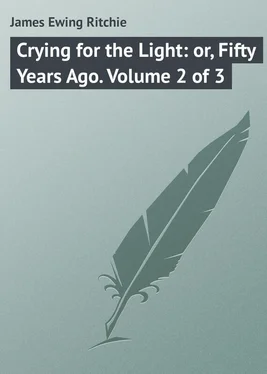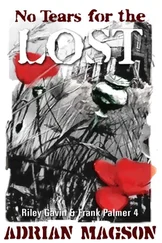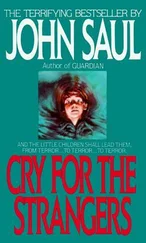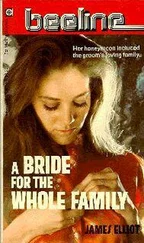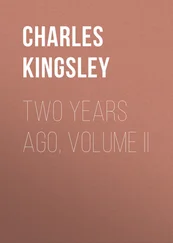James Ritchie - Crying for the Light - or, Fifty Years Ago. Volume 2 of 3
Здесь есть возможность читать онлайн «James Ritchie - Crying for the Light - or, Fifty Years Ago. Volume 2 of 3» — ознакомительный отрывок электронной книги совершенно бесплатно, а после прочтения отрывка купить полную версию. В некоторых случаях можно слушать аудио, скачать через торрент в формате fb2 и присутствует краткое содержание. Жанр: foreign_prose, на английском языке. Описание произведения, (предисловие) а так же отзывы посетителей доступны на портале библиотеки ЛибКат.
- Название:Crying for the Light: or, Fifty Years Ago. Volume 2 of 3
- Автор:
- Жанр:
- Год:неизвестен
- ISBN:нет данных
- Рейтинг книги:3 / 5. Голосов: 1
-
Избранное:Добавить в избранное
- Отзывы:
-
Ваша оценка:
- 60
- 1
- 2
- 3
- 4
- 5
Crying for the Light: or, Fifty Years Ago. Volume 2 of 3: краткое содержание, описание и аннотация
Предлагаем к чтению аннотацию, описание, краткое содержание или предисловие (зависит от того, что написал сам автор книги «Crying for the Light: or, Fifty Years Ago. Volume 2 of 3»). Если вы не нашли необходимую информацию о книге — напишите в комментариях, мы постараемся отыскать её.
Crying for the Light: or, Fifty Years Ago. Volume 2 of 3 — читать онлайн ознакомительный отрывок
Ниже представлен текст книги, разбитый по страницам. Система сохранения места последней прочитанной страницы, позволяет с удобством читать онлайн бесплатно книгу «Crying for the Light: or, Fifty Years Ago. Volume 2 of 3», без необходимости каждый раз заново искать на чём Вы остановились. Поставьте закладку, и сможете в любой момент перейти на страницу, на которой закончили чтение.
Интервал:
Закладка:
‘O Thou, the God of life and light,
In whom all heaven and earth unite,
Fain would I raise my humble voice
And with all people round rejoice.
‘I cannot see Thee as Thou art,
I only know Thee with the heart.
All language fails me when I try
To shadow forth Thy Deity.
‘I love, I worship, I adore —
Can man give less, can God ask more?
That love in life I would translate,
And freely trust Thee with my fate.’
CHAPTER XII.
IN LOW COMPANY
Nothing was blacker than the outlook in this land of ours fifty years ago. The parson droned away on Sunday, preaching a gospel which had not the remotest reference to living men, and good people sighed placidly as the preacher dwelt apparently con amore – and without the slightest sign of regret – on the torture and the flame to which the wicked would be eternally condemned. The hearer, if well to do, went home complacently to his Sunday dinner and glass or two of port; while the poor sinner preferred to sleep off the Saturday night’s debauch, leaving the missus and the children to go to a place of worship, on the condition that the dinner should not be forgotten. But it was chiefly the small shopkeepers who came to attend what were called the means of grace. I remember a parish clerk who made a point of attending the Wesleyan chapel in the evening. In time the old vicar died and a new one reigned in his stead. In his wisdom he proposed to have evening service in the parish church to hinder the sheep from roving in forbidden pastures.
But said the parish clerk, when his vicar suggested the idea: ‘Oh no, sir; that will never do. You will deprive me of the means of grace altogether.’
Surely when Queen Victoria commenced her reign the sun never shone on a darker land than ours. Ignorance, poverty, intemperance, licentiousness ran riot – in spite of the fact that good people were subscribing their tens of thousands to spread the Bible all over the world and to convert the heathen, who many of them lived more decent lives than our own people. Not far from the scene of which I write, a noble lord, who had been a sailor and had a fine gift of swearing, presided over a local meeting of the British and Foreign Bible Society. As a chairman he laboured under many difficulties, but he managed to make a short speech, in which he assured his hearers that the society was a d-d good one and deserved to be d-d well supported. The country life of the gentleman was just what we see it in ‘Tom Jones.’ In the towns things were little better. Lives were shortened by intemperance and neglect of all sanitary requirements. The employer had no thought for the people he employed. The peasant and the workman had little done for them, the pauper had even less. There were no cheap newspapers to stir up the sleeping intellect of the country. If such a thing as a national conscience existed it was very feeble – eaten up with pride. The Englishman was dead to the needs of the times. The bitter cry of the distressed had not then sounded over the land.
Little children from four to eight years of age, the majority of them orphans, the rest sold by brutal parents, were trained as chimney-sweeps. In order to make their skins tough and not to suffer as they climbed they were rubbed with brine before a hot fire. They were liable to what was called chimney sweeper’s cancer. They were often suffocated by soot and died when at work. Often they were stifled by the hot sulphurous air in the flues; often they would stick in the chimney and faint from the effects of terror, exhaustion and foul air. Lighted straw was used to bring them round, and if that failed they were often half killed, and sometimes killed outright, by the efforts to extricate them. Sailors were sent to sea in ships heavily insured – and great was the loss of valuable life – in order that some shipowners might reap a hellish profit. It was reckoned that at that time the preventible mortality of the country was annually 90,000. In 1843 there were 1,500 young persons of fourteen and upwards engaged as milliners and dressmakers in the Metropolis. Their hours were from fifteen to eighteen a day, with only a little interval of rest, and the consequence was that consumption and impaired eyesight were terribly prevalent among them.
As late as 1854 a gentleman who commenced a religious service in one of the largest cottages on his estate for the benefit of the dense population around him of miners, had to give up the good work, as he was threatened with a prosecution for the breach of the Conventicle Act. Churchyards in overcrowded districts were allowed to spread disease and death all around. The houses in which the poor were forced to herd were almost destitute of sewage drainage and water supply.
It was found that in the fourteen houses of which Wild Street, Drury Lane, for example, consisted, nearly one thousand persons found shelter, and that the very staircases were crowded nightly with poor wretches, to whom even the pestilential accommodation of the rooms was an unattainable luxury. It was said that more beggars were to be encountered in a walk from Westminster Abbey to Oxford Street than in a tour from London to Switzerland, whether by Paris or the Rhine. There were 80,000 in the common lodging-houses of the City, and no authority to see that decency and proper sanitary conditions were applied to any of them. Nor were the homes of the agricultural peasants much better.
When Lord Ashley became Earl of Shaftesbury, and took possession of the family estate, he writes: ‘Inspected a few cottages – filthy, close, indecent, unwholesome.’ All England was a whited sepulchre, full of dead men’s bones. But the climax of wickedness was only to be seen in a low London lodging-house; let us enter one.
Mint Street, Borough, was better known than trusted some years not very long ago. It was a nasty place to go down of a night, especially if you happened to be the owner of a watch or had a sovereign or two in your pocket, nor did the police much care to explore its mysteries. Somehow or other the place bore a bad name, and has ever done so since the days of Jonathan Wild and his merry men, who at one time are reported to have resided there. In its low lodging-houses were to be found the very scum of the earth – the virtuous and deserving poor, as they would have us believe they are, always in search of employment, which they unfortunately never find – who are dishonest, and lazy, and improvident, and drunken, and dissolute, very much against their own inclination, and to their own intense disgust – the victims of the wicked landlord or wickeder capitalist. They live in the lodging-houses of the district, which are generally pretty full, at the rate of fourpence a night, except when the hop-picking is on, when away the inmates tramp by the hundred down to the pleasant hop-gardens of Kent, or Sussex, or Hampshire, carrying with them all the filth and squalor of the town, tainting the air and polluting the fair face of Nature as they pass along. It is true that now the city missionary follows in their steps, otherwise it would be a bad look-out indeed.
Turning down into the street, avoiding the policeman who happened to be on duty at the time, one summer evening might be seen a man and a woman. They were tired and dusty, and had evidently travelled far. On both was the mark of Cain, and they were fleeing from justice to quarters where guilt and shame find convenient repose. They knocked at a door, where, after they had been surveyed through a wicket, they were received on the payment of such small sum as the deputy-keeper was legitimately entitled to charge. It was a big room into which they entered, with a great fire at one end, at which various cooking operations were going on; and on the benches at the side some slept, or smoked, or talked, or read, as the fancy suited them. Behind was a yard, in which one or two were engaged in the process familiarly known as cleaning themselves up.
Читать дальшеИнтервал:
Закладка:
Похожие книги на «Crying for the Light: or, Fifty Years Ago. Volume 2 of 3»
Представляем Вашему вниманию похожие книги на «Crying for the Light: or, Fifty Years Ago. Volume 2 of 3» списком для выбора. Мы отобрали схожую по названию и смыслу литературу в надежде предоставить читателям больше вариантов отыскать новые, интересные, ещё непрочитанные произведения.
Обсуждение, отзывы о книге «Crying for the Light: or, Fifty Years Ago. Volume 2 of 3» и просто собственные мнения читателей. Оставьте ваши комментарии, напишите, что Вы думаете о произведении, его смысле или главных героях. Укажите что конкретно понравилось, а что нет, и почему Вы так считаете.
